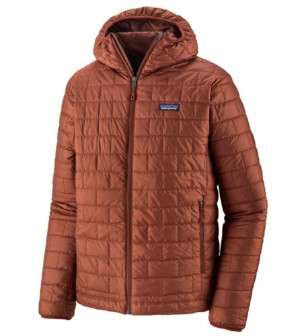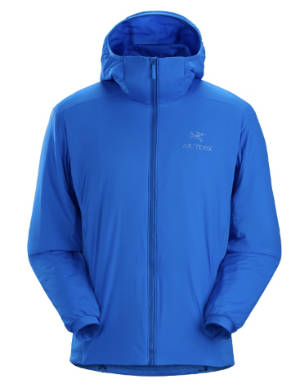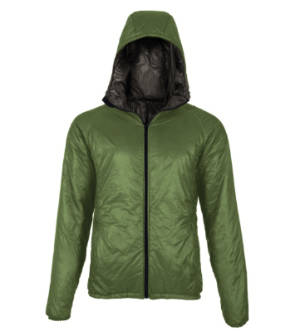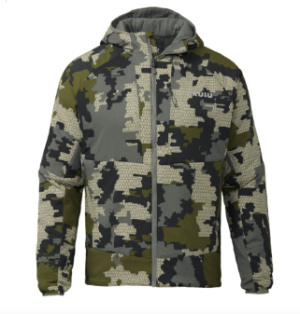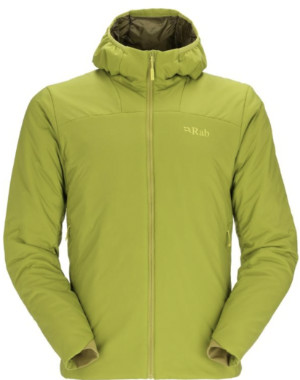[ad_1]

An insulated hoodie or lightweight synthetic jacket can be used for hiking or backpacking as an outer layer or mid-layer during spring and autumn when mornings and nighttime temperatures stay cool. Our preference is to use jackets that have hoods because we think that’s a must-have layering feature for hikers and backpackers. This lets you use them in camp or for extra warmth at night under a quilt or sleeping bag. Here are synthetic jackets we recommend across a variety of price points. Be sure to check out our buyer’s guide and recommendations below, so you choose the right synthetic insulated jacket for your needs.
1. Patagonia Nano Puff Insulated Hoodie
2. Arc’teryx Atom Insulated Hoodie
3. Mountain Hardwear Ghost Shadow Insulated Hoody
4. Enlightened Equipment Torrid Jacket
5. KUIU Kenai Hooded Jacket
6. Outdoor Research Superstrand LT Insulated Hoodie

7. The North Face Thermoball ECO Hoodie
8. Montbell U.L. Thermawrap Parka
9. Rab Xenair Alpine Light Insulated Jacket
10. Cotopaxi Teca Calido Hooded Jacket
Synthetic Insulated Hoodie and Jacket Buying Guide
Best Use: Mid-layer vs Outer-layer
As a hiker or backpacker, you’re likely to use a lightweight synthetic jacket while eating dinner in camp, at night as secondary insulation in a sleeping bag or under a quilt, or as a warm layer when you stop to take a hiking rest break during the day and feel a chill.
Many manufacturers will try to sell you on the idea that these jackets can be used as a mid-layer under a shell. That may be true if you’re standing around waiting for the ski gondola or belaying a climbing partner, but you’ll sweat too much, and soak your baselayers if you try to wear them under a rain jacket/shell while you’re hiking vigorously.
Compared to Fleece Jackets
Synthetic insulated jackets and hoodies tend to be warmer than fleece jackets and provide much better wind protection. They also tend to weigh slightly less. But fleece by itself is much more breathable. There are pros and cons to both garments for active use.
Polyester Insulation
Most of the synthetic insulation used in the jackets above is polyester, although it can differ in form. Some manufacturers try to mimic the compressibility of down with it by combining different lengths of polyester in a single garment while others simply sew bats of it between the outer fabric and jacket liner. In general synthetic insulation is less compressible than down, but it maintains its warmth better when it gets damp or wet. Still, synthetic insulation only has the equivalent of 550-650 down fill-power by weight, which is something to consider if warmth to weight is an issue. Synthetic insulation also does breaks down faster than down with repeated stuffing (compression), losing it ability to trap warmth.
Thermal Insulation Value
Unlike down insulation, it is difficult to compare two lightweight synthetic jackets in terms of warmth because most manufacturers use their own proprietary insulation and don’t tell you how much of it has been used to insulate the jacket. Manufacturers do tend to assign temperature ratings for their jackets, which can be somewhat helpful in determining their relative warmth although there is no standard method for assigning these either. When reading jacket specs, many manufacturers will list the weight of the insulation they use, as in 40 grams/sq meter and so forth. This reflects the weight of the insulation when sold in bulk, not the actual amount of insulation in the jacket, and is pretty meaningless from a consumer standpoint.
Sewn Thru vs Baffled Construction
With very few exceptions, lightweight synthetic jackets and hoodies have what is called a sewn-through construction where the front and back of the jacket are sewn together, mainly for appearance’s sake, although it can prevent certain types of polyester insulation from shifting. However, warm air can leak through the needle holes resulting in a slightly cooler jacket.
Shell Fabrics and DWR
Most of these jackets have nylon shells that have a DWR (durable water repellent) coating applied to them to repel mist and light rain. Where they differ is in the thickness of the external fabric, expressed in denier. Generally speaking, a 20D nylon fabric will be more durable than a jacket with a 10D shell fabric. While a 10D will be lighter weight and more compressible, it’s likely to hole more quickly or show wear and tear, particularly at the wrist cuffs than a jacket made with heavier fabric.
Hood Controls
The hoods on many lightweight or ultralight synthetic hoodies and jackets are quite rudimentary, with elasticized hood openings that may be too large to prevent cold drafts from entering around your ears. It really depends on the size of your head and the specific jacket. Hoods that are 1-way adjustable have volume controls in the back that let you shrink the size of the hood to provide a better fit. Hoods with 2-way adjustability go one step further and add neck cords that allow you to size the opening to just fit your face and block out any drafts. This level of function is pretty rare on lighter-weight synthetic jackets and hoodies, though.
Pockets
When shopping for lightweight insulated jackets, you’ll want a pair of zippered handwarmer pockets at a minimum for storing gloves and other items you want close-to-hand. A chest pocket is also desirable if you use a Smartphone for navigation. While it’s nice to have a pocket that you can stuff your jacket into, it really is a nice-to-have, that’s more useful for climbers to attach to a sit-harness than backpackers or hikers who have backpacks to carry stuff.
Hoodies, Jackets, Sweaters, Anoraks, and Parkas
Manufacturer product names are very inconsistently applied when it comes to lighter-weight down hoodies and jackets. In general hoodies, sweaters, anoraks, weigh close to one pound. Look for ones with hoods, as they provide the most head and neck insulation. When it comes to jackets, some are lightweight and some are heavier and meant for winter use in harsh conditions. You really have to look at the overall jacket weight to determine which is which. Anything up to or slightly over 16 oz will be good for transitional weather in spring or autumn down to freezing by itself or layered under a shell, while heavier jackets will be more appropriate for winter use. Parkas are almost always intended for very cold winter conditions.
SectionHiker is reader-supported. We only make money if you purchase a product through our affiliate links. Help us continue to test and write unsponsored and independent gear reviews, beginner FAQs, and free hiking guides.
[ad_2]


